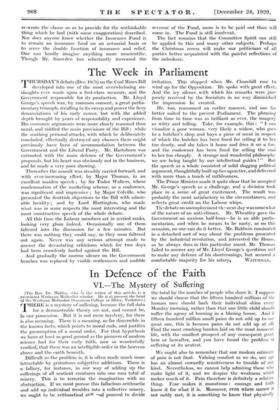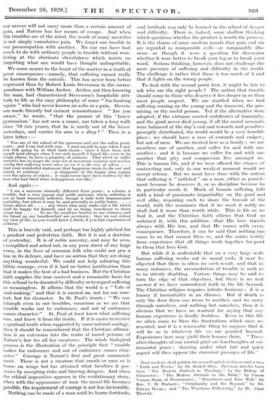In Defence of the Faith
VI.—The Mystery of Suffering
[The Rev. Dr. Maltby, who is tho writer of this article, is a prominent Wesleyan Methodist scholar. He is at present the head of the Wesleyan Methodist Deaconess College at Ilkley, Yorkshire.]
THERE is a mystery of suffering, because the full data for a demonstrable theory are not, and cannot be, in our possession. But it is not mere mystery, for there is also meaning. There is a meaning, so far discernible in the known facts, which points to moral ends, and justifies the presumption of a moral order. For that hypothesis we have at least as good ground as the pioneers of modern science had for their early faith, now so wonderfully verified, that there was an intelligible order in the heavens above and the earth beneath.
Difficult as the problem is, it is often made much more intractable by gratuitous subjective additions. There is a fallacy, for instance, in our way of adding up the sufferings of all sentient creatures into one sum total of misery. This is to terrorize the imagination with an abstraction. If we must pursue this fallacious arithmetic and add up individual troubles into a collective misery, we ought to be arithmetical stilt ^nd proceed to divide the total by the number of people who share it.' I Suppose we should choose that the fifteen hundred millions of the human race should bark their individnal shins every Monday morning, rather than that one little child should suffer the agony of burning in a blazing house. And if fifteen hundred million small pains do not add up to one great one, this is because pains do not add up at all. Find the most crushing burden laid on the most innocent life, with the smallest prospect of any consequent good. here or hereafter, and you have found the problem of suffering at its acutest.
. We ought also to remember that our modern estimate of pain is not final. Valuing comfort as we do, our age has an almost cowardly sensitiveness to trouble of any kind. Nevertheless, we cannot help admiring those who make light of it, and we despise the weakness which makes much of it. Pain therefore is definitely a relative thing. Fear makes it monstrous : courage and faith know it for what it is. Moreover, even where sorrow is not nobly met, it is something to know that physically our nerves will not carry more than a certain amount of pain, and Nature has her means of escape. And when the troubles are of the mind, the result of many anxieties is not simply cumulative pain. We forget one trouble in our preoccupation with another. No one can have had much to do with ordinary people in trouble withOut won- dering at the obstinate cheerfulness which insists on forgetting what one would have thought unforgettable.
We come nearer to the heart of the matter in a truth of great consequence—namely, that suffering 'cannot really be known from the outside. This has never been better expressed than by Robert Louis Stevenson in the corres- pondence with William Archer. Archer, not then knowing the man, had characterized Stevenson's hospitable atti- tude to life as the easy philosophy of some " fox-hunting squire " who had never known an ache or a pain. Steven- sbn made friendly but earnest remonstrance. " Are you aware," he wrote, " that the praiser of this ' brave gymnasium ' has not seen a canoe, nor taken a long walk since '79 (six years), that he is rarely out of the house nowadays, and carries his arm in a sling ? " Then in a later letter You are of the school of the generous and not the sullen pessi- mists ; and I can feel with you. I used myself to rage when I saw sick folk going by in their bath-chairs since I have been sick myself (and always when I was sick myself) I found life, even in its rough places, to have a• property of easiness. That which we suffer ourselves has no longer the same air of monstrous injustice and wanton cruelty that suffering wears when we see it in the case of others. . And your .wonderful statement that happiness tends to die out and misery to continue . . . . is diagnostic of the happy man raging over the misery of others ; it could never have been written by the man who had tried what unhappiness was like." ' And again •
" I see a universe eternally different from yours ; a solemn, "a terrible, but a very joyous and noble universe, where suffering is not at least wantonly inflicted, though it falls with dispassionate partiality, but where it may be, and generally is, nobly borne . . . . where above all . . . . any. brave man may make out a life which shall be happy for himself, and by so being, beneficent to those about him . . . . To me the medicine bottles on my chimney and the blood on my handkerchief are accidents ; they do not colour my view of life, as you would lmow I think; if you had experience of sickness."
This is bravely said, and perhaps too highly pitched for a prudent and pedestrian faith. But it is not a doctrine of yesterday. It is of noble ancestry, and may be seen, exemplified and acted out, in any poor street of any large town, in the lives of common folk who could not pen a line in its defence, and have no notion that they are doing anything wonderful. We could not help admiring this blithe courage, even if it had no better justification than that it makes the best of a bad business. But the Christian faith supplies the true context and a reasonable basis for this refusal to be daunted by difficulty or to regard suffering as meaningless. It affirms that the world is a " Vale of soul-making," and that it is carried on, not for our com- fort, but for character. In St. Paul's words : " We can triumph even in our troubles, conscious as we are that trouble works out to endurance, and out of endurance comes character." St. Paul at least knew what suffering was, and knew it from the inside. If it is easier to receive a spiritual truth when supported by some natural analogy, then it should be remembered that the Christian affirma- tion is an extension into the realm of moral persons_ of Nature's law for all her creatures. The whole biological process is the illustration of the principle that " trouble makes for endurance and out of endurance comes char- acter." Courage is Nature's first and great command- ment. There is not a creature that crawls or runs or is borne on wings but has attained what faculties it pos- sesses by accepting risks and braving dangers. And when the ethical imperative appears in the evolutionary story, when with-the appearance of man the moral life becomes possible, the requirement of courage is not less inexorable.
lathing can be made of a man until he learns fortitude, and fortitude Can only be learned in the school of danger and difficulty. There is, indeed, some shallow thinking which questions whether the product is worth the process. It is the shame of some modern moods that pain and sin are regarded as comparable evils—or comparable illu- sions--as though it were a question for discussion whether it were better to break your leg or to break your word. Serious thinking, however, does not challenge the mere presence of suffering and difficulty in the world. The challenge is rather that there is too much of it and that it lights on the wrong people.
To deal with the second point first, it might be fair to ask who are the right people ? The notion that trouble should come to those whO deserve it lies deeper in us than most people suspect. We are startled when we find suffering coming on the young and the innocent, the pro- mising., Or the useful person. Yet if the alternative were adopted, if the virtuous carried certificates of immunity, and the good never died young, if all the moral accounts were balanced at the day's end and rewards and penalties promptly distributed, the world would be a very horrible place : we should have a race of cowards and cadger:, but not of men. We are treated here as a family ; we are members one of another, and suffer for and with one another ; and it is because we suffer for and with one another that pity and compassion live amongst us.
This is human life, and if we were offered the chance of contracting out, only in our weakest moment would we accept release. But we must have done with the notion that suffering is " inflicted " on a man, either as punish- ment because he deserves it, or as discipline because he in particular needs it. Much of human suffering falls with a kind of passionate impartiality on the good and evil alike, requiring each to share the travail of the world, with the assurance that if we meet it nobly we shall find it more than worth while. This is life as we find it, and the Christian faith affirms that God so ordained it, with this addition—that His love travels always with His law, and that He comes with every consequence. Therefore, it can be said that nothing can come to us that cannot bless us, and the saints testify from experience that all things work together for good to them that love God.
But while it is undeniable that on a very large scale human suffering works out to moral ends, it may be objected that there is often no such result, and that in many instances, the accumulation of trouble is such as to be utterly disabling. Various things may be said to turn the edge of that objection, but there is no real answer if we have surrendered faith in the life beyond. The Christian religion requires infinite horizons : it is a lunacy if immortality is an illusion. But if death is only the door from one room to another, and we carry through ourselves, and nothing but ourselves, then it is obvious that we have no warrant for saying that any human experience is finally fruitless. Even in this life we often come to bless the frustrations which once we resented, and it is a reasonable thing to suppose that it will be so in whatever life we are granted beyond. Experiences here may yield their lessons there. " These after-thoughts of our mortal grief are forethoughts of our immortal peace ; showing under what fair and quiet aspect will then appear the stormiest passages of life."
Next week we shall publish the seventh article in this second series, " Faith and Works," by Dr. Rudolf Otto. Previous articles have been " The Modern Outlook in Theology," by the Bishop of Gloucester ; " The Modern Attitude to the Bible," by Canon Vernon Storr, of Westminster ; " providence and Free Will," by Rev. F. H. Brabant ; " Christianity and the Beyond," by Dr. Edwyn Bevan ; and " The WondrOus Fellowship," by Mr. Algar Thoreld:

































 Previous page
Previous page